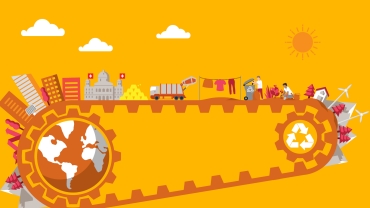
Our stated aim is to build trust and help solve the world’s major problems. Climate change is one of these problems. That’s why we’re pleased to play a part in making Switzerland a more sustainable and greener business location through our partnership with swisscleantech.
By adopting its 2050 climate strategy, the Federal Council is upholding the Paris Agreement, and the aim is that Switzerland will not emit more greenhouse gases than can be absorbed naturally or by technical means. In order to achieve these goals, we intend to set a good example by actively committing to promoting green growth. We’ll work together with our partner organisations like swisscleantech to forge new paths and develop solutions that make it possible to transition to a low-carbon and climate-resilient economy.
As the leading audit and advisory firm in Switzerland, PwC has ties with many industry stakeholders. We’ve noticed that there’s growing interest in climate policies. But the basic requirements need to be in place. This is why, as part of swisscleantech’s CEO4climate initiative, we’re actively participating in the dialogue on effective climate policy in order to support Switzerland’s development as a sustainable business location.
As part of our sustainability strategy, we’ve set ourselves a goal to systematically reduce our own impact on the climate, which is why in September 2020 we committed to cutting our greenhouse gas emissions to ‘net zero’ worldwide by 2030. We’ve been calculating, managing and monitoring our carbon footprint since 2015 in order to systematically lower our impact on the climate. Our sustainable waste disposal and recycling system has been in place for several years. We’ve also been offsetting our flight emissions since July 2018, and by the 2022 financial year 100% of our electricity needs will be covered by renewable sources through our membership in RE100.
At PwC we’re aware of our responsibility to ensure our services accelerate the transition to a green future. In July 2020, we set up a Centre of Excellence for Sustainability, led by Christophe Bourgoin, Partner and Leader Sustainability and Investor Reporting. It reflects our integrated way of working because we’re convinced that this highly complex issue requires a cross-industry and interdisciplinary approach. As a result, our experts in the areas of tax and legal advisory, audit and financial advisory regularly share their experiences so that our clients receive the best possible support with avoiding risks triggered by climate change and to help them develop and implement concrete plans to achieve their ‘net-zero’ goals.
Since change begins with asking the right questions, we take part in national and international sustainability initiatives. So, over the past two years we’ve been actively involved in a working group set up by the World Economic Forum (WEF), collaborating with other firms to compile sustainability indicators known as Stakeholder Capitalism Metrics. The aim of this is to standardise the non-financial reporting activities of companies around the world and to promote collaboration in this area.
The transition to a more sustainable future requires constructive dialogue. This is why our experts identify and highlight long-term sustainability trends and share this knowledge externally to encourage discussions and actively address problems. In January 2021, together with WWF Switzerland, we published a report on the circular economy. The year before that we focused more closely on biodiversity and presented our results at the WEF in Davos.
Sustainability is an important issue for us at PwC. Since it’s better to take large steps together, we see the changes that are needed for a green economy as a welcome opportunity to shape our future together with our employees, our clients and our partner organisations like swisscleantech.
#social#

Circularity as the new normal
In their new report, PwC and WWF introduce a sustainable way of doing business – setting a course for a circular economy to give you new revenue streams and reduce resource dependence.








